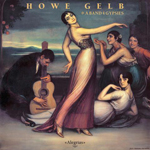|
|
 |
Dusted Reviews
Artist: Howe Gelb & A Band of Gypsies Album: Alegrias Label: Fire Review date: May. 11, 2011 |

|
|
|
 |
You could think of Alegrias as a companion piece to Howe Gelb’s 2006 Sno Angel. That record, which many consider his best, reimagined Gelb’s desert country blues as gospel, with a full choir in tow. Alegrias reworks selections from the Gelb catalog, some new songs and one flamenco cover in the fiery, multiple guitar’d styles of southern Spain. It was recorded on a rooftop in Cordoba, with flamenco star Raimundo Amador along with a passel of gypsy players, in a series of laid-back sessions that find connections between American blues and Andalusian flamenco.
The majority of Alegrias’s material will be familiar to the most dedicated Gelb fans, stretching temporally from the 1987 Giant Sand song “Uneven Light of Day,” through Gelb’s solo discs (“4 Door Maverick” from 1998’s Europe-only Hisser, “Notoriety” and “Hangin’ Judge” from 1998’s Upside Down Home, “Blood Orange” from 2003’s The Listener and “Saint Conformity” from 2006’s Confluence) .
Not all of these songs are radically transformed. “Saint Conformity” shambles in whispered decadence, its unforgettable couplets (“She went from a small looker / to dressing like a myopic, optimistic hooker”) framed by the same smoldering blues licks as ever. “4 Door Maverick” delves a little further into the flamenco style, perhaps incidentally. It slips incendiary runs and flourishes into its widely spaced, country blues meditations and pulls up short at the end of the verse, in a scrambling, castanet-clicking bravado. “Uneven Light of Day” adds hand percussion to its Andalusian textures, its guitars multiplied into a scratchy, fractious choir. Nearly a quarter century ago, Gelb wrote the lines that declared, “Now Clint Eastwood and Neil Young won’t make a statement on this one / because big guitars and big guns won’t put a dent in this one.” And still, a giant Neil Young like crash of a chord splits this song in two, its blistered rock heaviness landing on more delicate strums like a falling beam at a construction site.
The interesting thing is that flamenco fits fairly smoothly into Gelb songs from all periods. This is perhaps because he has always built a certain amount of Spanish influence into his Arizona blues. It may also be due to innate similarities between flamenco and the blues, the fact that both styles use a limited number of chords and rely heavily on improvisation. In Spain, too, flamenco has been incorporated into popular music, much as blues has become the foundation for rock and roll elsewhere. Fernando Vacas, the musician and Cordoban producer for Alegrias, works in much the same way that Gelb does, riffing on traditional styles and splicing them with other musical DNA. His “Lole & Manual,” which Gelb covers on Alegrias, is built on bossa nova rhythms, its shimmering flamenco runs and bends framed by the slinking, sensual but wholly un-Andalusian syncopations.
It’s striking how well the gypsy sound fits with older material, but even so, the best song on Alegrias was written specifically for the album. That’s “Cowboy Boots on Cobblestone,” which opens with the disc’s most searing flamenco guitar solo and a Spanish language count. It moves from there into the kind of desert dry, talk-sung, apocalyptic blues that Gelb does best. “Cowboy boots on cobblestone / I walk around like I own…the sound,” sings Gelb in his wandering, offhand tenor. But on records like Alegrias, you realize that no one owns any sound really, and that the best results come when you share.
By Jennifer Kelly
|







